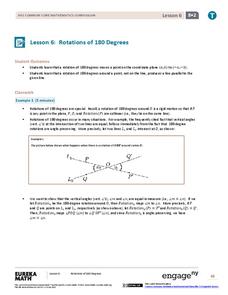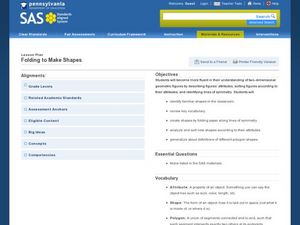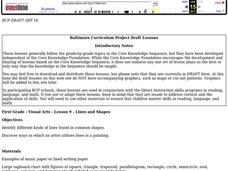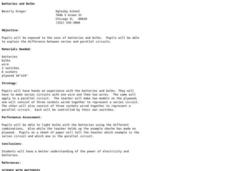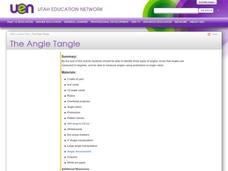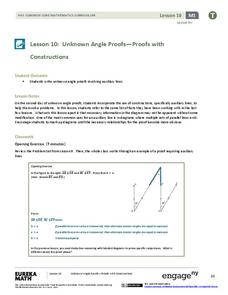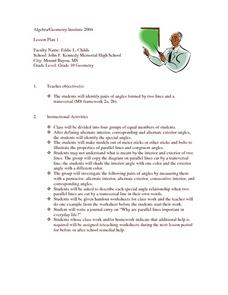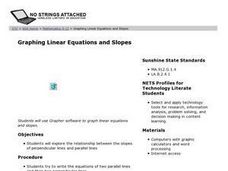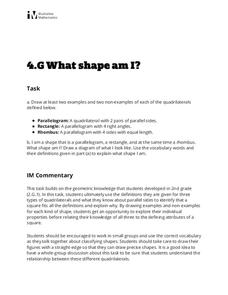EngageNY
Special Lines in Triangles (part 2)
Medians, midsegments, altitudes, oh my! Pupils study the properties of the median of a triangle, initially examining a proof utilizing midsegments to determine the length ratio of a median. They then use the information to find missing...
EngageNY
Rotations of 180 Degrees
What happens when rotating an image 180 degrees? The sixth lesson in the series of 18 takes a look at this question. Learners discover the pattern associated with 180-degree rotations. They then use transparency paper to perform the...
EngageNY
Special Lines in Triangles (part 1)
Allow your pupils to become the mathematicians! Individuals explore the properties of a midsegment of a triangle through construction and measurement. Once they figure out the properties, learners use them to draw conclusions.
Curated OER
Folding to Make Shapes
Second graders identify different polygons and their attributes. In this geometry lesson, 2nd graders get to know polygons by studying the vocabulary and finding polygons in their classroom. They create these shapes and then find their...
Curated OER
Constructing Perpendicular Bisectors
Tenth graders investigate parallel lines and the angles formed when cut by a transversal. In this geometry lesson, 10th graders construct perpendicular lines and discuss midpoint, segments and perpendicular bisectors. They relate...
Illustrative Mathematics
What is a Trapezoid? (Part 1)
Challenge your class to construct a definition for trapezoids. Looking at four examples and four non-examples, students individually create definitions and use them to classify an unknown shape. Allow for small group and whole-class...
Curated OER
Raise the Roof
There are only four different dance moves to teach in this activity. Each move is done for eight-counts. First is pushing the hands above the head, second is a combination of moving the arms and shrugging the shoulders. Third is doing a...
Curated OER
Lines and Shapes
First graders identify different kinds of lines found in common shapes. They discover ways in which an artist utilizes lines in a painting.
Curated OER
Reflections over Two Lines & Dilations
Students create reflections over two lines. In this reflections worksheet, students compare and contrast reflections over parallel and intersecting lines. They dilate figures and investigate the effect of the dilation using measurement...
Curated OER
Batteries and Bulbs
Students examine the uses of batteries and bulbs and explain the differences between series and parallel circuits. In this circuits lesson students complete a lab activity.
Curated OER
Is the Slope Legal?
Students define parallel and perpendicular lines. In this algebra lesson, students relate the concept of parallel and perpendicular lines to the real world. They classify the lines based on their slopes.
Curated OER
Declaration of Independence
Pupils analyze a copy of the Declaration of Independence to discover how it was adopted, approved, and signed. The tone and style of the document are analyzed for intention through an exploration its the language and vocabulary.
Curated OER
Angles
Fourth and fifth graders investigate angles and name them according to the criteria for obtuse, acute, and right angles. They examine a human-made yarn pattern on the floor of their classroom and identify angles, vertices, and types of...
Curated OER
Arkansas is Our State: Differentiating Between a State and a Country
An ambitious geography lesson is geared toward kindergartners. They discover what the differences are between states and countries. They look at maps of Arkansas, and learn what the shapes and lines mean. Additionally, they create a...
Curated OER
Angles, Parallel Lines, and Polygons
Students examine how to investigate polygons using an instrument of their own construction. They should be able to prove the general formula for the number of degrees in any polygon (including a triangle). Finally they investigate an...
Curated OER
Slope
Students graph lines and identify the slope. For this algebra lesson, students graph a line using y=mx+b and graph lines that are horizontal or vertical. They calculate the slope of the line using two points, and identify lines by their...
EngageNY
Solve for Unknown Angles—Transversals
Lead your class on an exciting journey through the world of math as they review geometry facts and solve for unknown angles. They learn how to use auxiliary lines and congruent angles to correctly complete each practice problem...
EngageNY
Unknown Angle Proofs—Proofs with Constructions
Provide your emerging mathematicians with the tools to learn as they incorporate auxiliary lines to solve unknown angle proofs in this continuing segment. They decipher information from a diagram to uncover the missing pieces and...
EngageNY
Definition of Reflection and Basic Properties
Discover the results of reflecting an image. Learners use transparency paper to manipulate an image using a reflection in this fourth lesson plan of 18. They finish by reflecting various images across both vertical and horizontal lines.
Curated OER
Transversal and Angles
Tenth graders identify angles formed by parallel lines and a transversal. Using meter sticks and bolts, they perform hands-on activities to demonstrate the properties of parallel lines and congruent angles. They color code diagrams to...
Curated OER
Graphing Linear Equations and Slopes
Young scholars explore linear equations, parallel lines, perpendicular lines and slopes. Using computers with graphic calculators and word processing, students examine the relationship between the slopes of perpendicular lines and...
Curated OER
Composition of Reflections
Students perform reflections and translations of polygons. In this geometry lesson, students perform reflection in two parallel lines. They use Cabri to observe the transformation and rotations of each shape.
Curated OER
Triangle Exploration
Students are introduced to The Geometer's Sketchpad software while in the computer lab. They focus on triangles, horizontal lines, vertex and top parallel lines. Each student utilizes geometry to complete basic geometric constructions.
Illustrative Mathematics
What Shape Am I?
Sharpen your pencil and grab a ruler, it's time to draw some quadrilaterals! Given the definition of a parallelogram, rectangle, and rhombus, learners draw examples and nonexamples of each figure. The three definitions are...
Other popular searches
- Parallel Lines and Angles
- Slope of Parallel Lines
- Geometry Parallel Lines
- Parallel Lines Transversals
- Properties of Parallel Lines
- Introducing Parallel Lines
- Proving Parallel Lines
- Parallel Lines Lesson Plans
- Parallel Lines and Transversal
- Systems and Parallel Lines
- Parallel Lines, Transversal

